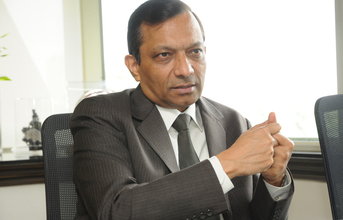
By now he has almost covered all the aspects of the different businesses he looks after, with equal passion and positivity. So I ask him, what the most challenging part of his job is. The answer is quick. "Maintaining balance between businesses as small as only about Rs20 crore and as large as Rs30,000 crore. In terms of the entire AFS P&L, what the 20 crore business does should make no difference even if it makes 100 percent profit or 100 percent loss. But then, that business is our future growth and therefore to keep this proportionate focus is one challenging part. He believes this works very well in the Mahindra philosophy of management where the senior most management, starting from Anand Mahindra gives higher focus on new upcoming businesses.
It has been a whirlwind of journey just speaking to him for about an hour. I wonder how it must have been for him being part of all the action for 20 years now. Of course, the two decades haven't been without regrets. That he couldn't make his mark in certain market segments is clearly on top of his mind. "We did not have enough conviction in aggressively coming to those segments where others came in and did very well. We lost out our opportunity," he says matter-of-factly. And the highlights? "The first and the biggest one has to be the Scorpio which I was the project leader for. That product, all believe, was a turning point for Mahindra in terms of its brand and in terms of respect in the market."
Second thing that he is very proud of is the Chakan plant. "It was a very big decision to invest money in at a time when the auto industry was slowing down in 2008-2009. For us to stay with that decision in that time period and invest that money was very good. From the process of selecting where the plants should be setup to negotiating with the government on the incentive package and from working with the team to the development of the layout, my involvement was very high. I think that plant will be a future asset for Mahindra in the automotive business." Then he identifies the Group's foray into the agri business and the SsangYong acquisition as the other two highlights. "Finally, it's the power train division. That again probably will become a future growth engine," he says, subtly connecting the past, the present and the future.
END


























